The Nissan LEAF is a fully electric car which is designed from the start to be electric. The car has a range of 100 miles and a top speed of 90 mph.
Engine and Batteries
The car has an AC synchronous electric motor of 80 kW (107 bhp) with a torque of 280 Nm. The motor is powered by 48 lithium-ion (Li-ion) batteries with a total capacity of 24 kWh. The batteries are located under the seats. This gives the car a low center of gravity. The battery pack will be covered by an 8-year, 100,000-mile warranty.
Top speed of the car is 90 mph and has a 100 miles/charge based upon US EPA LA4 City cycle. At 55 mph on the highway in 95 degrees and the A/C on, expect the range to be 70 miles.
Batteries
Sound
“Approaching Vehicle Sound for Pedestrians
The system makes it easy for those outside to hear the vehicle approaching, but the sounds do not distract the driver and passengers inside. Thus, the needs of pedestrian safety, as well as driver and passenger comfort, are met. The sound system is the first of its type to be introduced by an automaker.
In addition to reducing air pollution, Nissan LEAF and other electric vehicles (EVs) reduce noise pollution, making them transformative in yet another way. Unlike their gasoline-powered cars, EVs and hybrids run quietly. Today’s noisy traffic corridors have the potential to possess an almost serene ambience if populated with cars and trucks that are quieter.
While silence is golden, it does present practical challenges. In response to public concern that quiet EVs and hybrids can surprise pedestrians and the visually impaired as they approach, Nissan has developed a set of distinctive sounds that will come standard with Nissan LEAF to ensure a positive experience for drivers, passengers and pedestrians alike.
In developing the sound system, Nissan studied behavioral research of the visually impaired and worked with cognitive and acoustic psychologists. After looking at applied original technology developed to reduce vehicle noise and conducting tests in Japan and abroad, the Approaching Vehicle Sound for Pedestrians system was created.
The sine-wave sound system sweeps from 2.5kHz at the high end to a low of 600Hz, an easily audible range across age groups. Nissan worked to avoid a sound range that would add unnecessary noise to the environment (around 1,000Hz).
Depending on the speed and status (accelerating or decelerating) of Nissan LEAF, the sound system will make sweeping, high-low sounds. For instance, when Nissan LEAF is started, the sound will be louder, so a visually impaired person would be aware that a nearby car was beginning operations. And when a car is in reverse, the system will generate an intermittent sound. The sound system ceases operation when Nissan LEAF tops 30km/h and enters a sound range where regular road noise is high. It engages again as Nissan LEAF slows to under 25km/h.
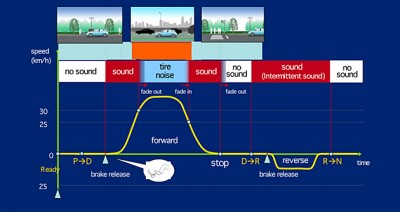
Use sounds to alert pedestrians
The system is controlled through a computer and synthesizer in the dash panel, and the sound is delivered through a speaker in the engine compartment. A switch inside the vehicle can turn off sounds temporarily. The system automatically resets to “On” at the next ignition cycle.
The Approaching Vehicle Sound for Pedestrians system conforms to guidelines set by Japan’s Ministry of Land, Infrastructure and Transport in its report, “Measures for dealing with the silence of hybrids and similar cars,” released in January, 2010.
Charging
The car as an 3.3 kW onboard charger for the battery and comes with a portable trickle charge cable (120V/20-A). As the name implies, this will be primarily used for opportunity charging and is not recommended to be the primary method of charging. For that, Nissan has a home charging dock which uses a 220/240V 40A dedicated line in the home. A full charge will take 8h on a 220/240V home charging station.
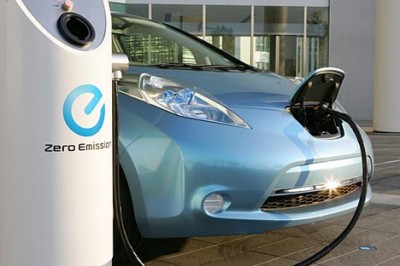
Charging Location in the Nose of the Car
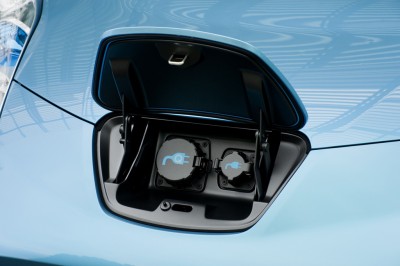
The Quick Charge (Left) and Home Charge (Right) Connector
A 480V quick-charging capability will eventually be available in many markets once a standard is set. 480V quickcharge 80% full will take 30 minutes.
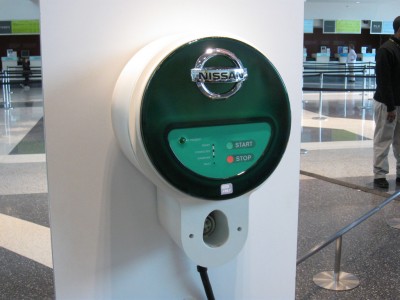
Prototype Quick Charging Station
It is possible to set a charging timer in the car and control the car’s functions and charging from any computer or internet-enabled phone.
Further, the Nissan LEAF’s navigation system will be able to show the charging locations along the route.
Home Charging
Regenerative Braking
Instead of wasting braking energy into heat like a fossil fueled car, the Nissan LEAF uses regenerative braking. During braking, the motor is used as generator which will slow the car down and also charge the batteries of the car.
Regenerative Braking
Energy Usage
A fully charged battery with a capacity of 24 kWh provides a range of 100 miles in the city. Therefore the consumption is 240 Wh / mile. The average US residential retail price for electricity in 2010 is $0.11 / kWh. The price per mile is 0,240 kWh x $0.11 = $0.026 or 2.6 dollar-cent per mile. A full battery load will cost 16 kWh x $0.11 = $2.64. With these full batteries there is a range of 100 miles.
Specifications
| Energy Usage | 240 Wh/mile |
| Weight | ? lbs |
| Range | 100 miles |
| Power | 80 kW |
| Acceleration 0-31 mph | ? sec |
| Acceleration 0-63 mph | ? sec |
| Battery Capacity | 24 kWh |
| Battery Type | Lithium-ion |
| Charging Time Batteries 100% (230V 14A) | 8 hr |
| Top Speed | 90 mph |
| Available | 2011 |
| Price | $25,280 |
Design
The Nissan LEAF is a compact, 5-door family sedan, with seating for 5 (3 child seats fit in the back seat). The car has LED headlights and tail lights. LEDs use far less power than conventional lights. The Nissan LEAF will have an available small solar panel on the rear spoiler to help charge the 12V accessory battery.
Rear View
Safety
The car has many safety features:
- Nissan Advanced Air Bag System with dual-stage supplemental front air bags with seat-belt and occupant-classification sensors.
- Driver and front-passenger seat-mounted side-impact supplemental air bags
- Roof-mounted curtain side-impact supplemental air bags for front- and rear-seat outboard occupant head protection
- Vehicle Dynamic Control (VDC) 7 with Traction Control System (TCS)
- Tire Pressure Monitoring System (TPMS)
- Nissan Vehicle Immobilizer System
- Vehicle Security System
Availability
Nissan LEAF will be on sale in Japan, the United States, Portugal and the Netherlands starting in December, 2010 and in the United Kingdom and Ireland starting February, 2011. Nissan plans to begin mass marketing Nissan LEAF in 2012.
Production will start in October at the Oppama plant in Japan. The second half of 2012 will see production at the Smyrna, Tenn., plant in the U.S., followed by production in the UK at the Sunderland plant in 2013. Annual Nissan LEAF production for Oppama is 50,000 units. The Lithium-ion battery that powers Nissan LEAF will be produced by Nissan’s joint-venture with NEC, AESC (Automotive Energy Supply Company). Originally planned annual battery production capacity at AESC was 65,000 units including 54,000 units for EV. However, AESC plans to increase annual battery production capacity for EV to 90,000 units by 2011, foreseeing an upward trend in future demand.
Additional Videos
Preview of the Nissan LEAF
Interesting links
- Manufacturer website of the Nissan LEAF
- More Articles about Electric Transport
- Overview of Electric Cars
Your opinion
What do you think of this car? Let us know by leaving a comment below.
More information
If you know more about this car, let us know by leaving a comment below. Please add the also the url with the source of your information.

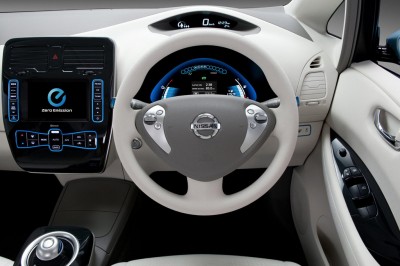
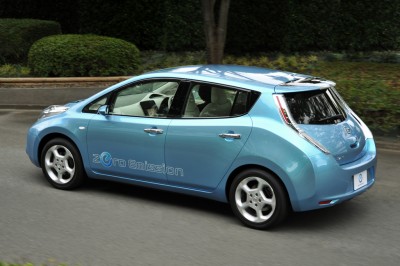
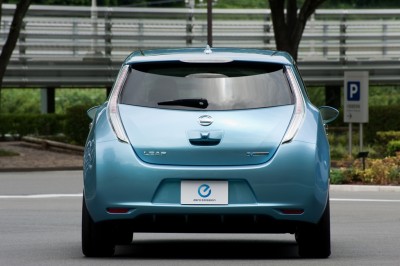

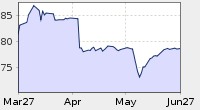

August 13th, 2010 at 4:14 pm
Since the big hold up to widespread cost-effectiveness of electric cars is the battery technology, I’d like to know more about that aspect. How much does the battery on this car cost? How often will it need to be replaced? How large is it? What does it weigh? Is this car’s battery a big advancement over other electric cars’ batteries?
September 7th, 2010 at 11:45 pm
Want to know each and every details on the car’s weight, battery longevity, cost, efficiencies etc. and it’s advancement over other electric car’s batteries. Really big database !
November 17th, 2010 at 3:49 am
Kudos to Nissan, I’m loving the LEAF. Lithium is a promising technology. IBM is currently developing a battery pack based on lithium Air, the next generation of lithium batteries that promises 10 times the energy density. Something that could give the LEAF an upgrade up to of 1,000 mile range.
February 8th, 2011 at 5:25 am
nissan cars with in the range of $us ten thousand should be availabe in india. indian market is increasing and people are shifting to electric cars. people are willing to spend rupee 500,000($us eleven thousand) on cars easily. if the design is good e-cars have a bright future.
March 25th, 2011 at 12:08 pm
nicecar veryvery bbyoutyful
May 21st, 2011 at 2:07 pm
the nissan leaf is good in featur in india if it is assambled in india and sell it in indian market but price is econoical and afortable because tfueal price is very high and people are searcheng and shifting to electric cars your desine is good and have agood future
March 30th, 2013 at 10:22 am
Nissan Leaf is a good car, however why this car didn’t launch worldwide? Our customers in Indonesia usually asked about this car to us
March 30th, 2013 at 10:25 am
Nissan Leaf (Leading, Environmentally friendly, Affordable, Family car) is a good car on its class and in India Leaf gain the popularity fast since its launched date
May 23rd, 2013 at 9:21 pm
Nissan LEAF and similar products that are environmentally friendly should continue to be developed. I just hope the government can support developing countries to prepare a regulation or exemption of import duties and taxes or facilities for the charging station.